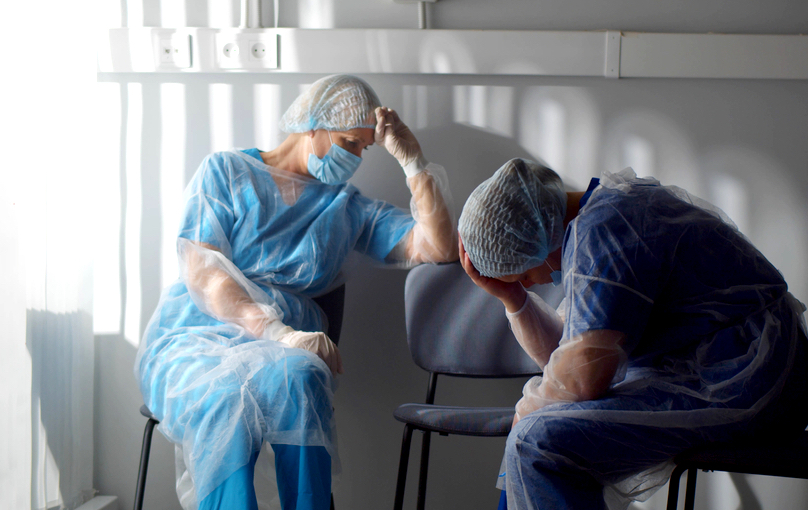When troubling events occur at your place of employment, how do you deal with trauma from work afterwards? To the average layperson, “workplace trauma” means a random shooting incident, sexual harassment, or assault. But if your career is in healthcare, you probably experience other forms of trauma multiple times each week:
- New waves of COVID-19 patients entering an understaffed and overloaded hospital
- Being personally exposed to contagious illness or other health-and-safety hazards
- The sight of people writhing with profuse bleeding, severe burns, or crushed limbs
- Lives lost despite your best efforts
- Lawsuits and threats of lawsuits
In light of everything healthcare professionals have to deal with—especially over the last two years—it shouldn’t be surprising that more than one in ten healthcare workers have substance abuse or addiction issues. Or that nearly three out of four have some level of sleep disorders, major depression, or PTSD. Not to mention the physical-health risks of being exposed to trauma and stress on a daily basis. How do you deal with trauma safely and effectively?
Stress vs. Trauma from Work
Technically, stress is different from trauma. Stress is the brain’s automatic response to challenging (not necessarily dangerous) circumstances: its intended purpose is to strengthen the body’s coping ability. Trauma is a sensation of extreme distress experienced during or after an overwhelmingly negative experience (usually an actual or perceived life-threatening situation) in which the victim feels completely helpless.
However, stress and trauma from work are closely related. Too much stress can make a person vulnerable to trauma, and many aftereffects of trauma are rooted in stress. (Stress is, after all, what the “S” in PTSD stands for.) For the purposes of this article, “trauma” refers to any emotionally wrenching experience and its aftermath, especially as related to feelings of helplessness and being trapped in an uncontrollable world.
If effects are allowed to accumulate, trauma ultimately leads to compassion fatigue, burnout, and sometimes leaving one’s job and/or developing mental illness or substance use disorder.
Dealing with Trauma from Work
The struggle to deal with trauma from work can be especially challenging for healthcare professionals, who, in addition to regularly witnessing others’ trauma, are expected to stay in control no matter how serious the situation. While this is a vital aspect of medical care, it can also generate the idea that any level of human weakness is shameful. If medical professionals are expected to be infallible, it logically follows that you are unfit for your job if you need extra time off or special support.
So it’s tempting to “deal with” trauma by pretending it doesn’t exist, or by resorting to unhealthy forms of stress management (e.g., larger-than-healthy servings of wine with each after-work meal). And when, inevitably, evidence surfaces that these “solutions” are generating new problems, fear of showing weakness may also mean procrastinating on seeking real help.
There are much better ways to cope once you learn how to deal with trauma at work. Here are some starter suggestions.
- Admit that, however impressive your credentials, you are as human as anyone else. Practice what you no doubt preach to your patients: get regular sleep and exercise, hurry only when essential, and enjoy all the time off you earn.
- Take a tip from the classic Higher Power concept and lean on something greater than yourself. This doesn’t necessarily have to be a “religious” power: it can be the values that first led you to the medical field.
- Don’t ignore your instincts when they tell you to get a second opinion. And be willing to listen to your subordinates. Tempering your pride may save you from the worst-case trauma scenario: making a serious and preventable medical error.
- Do recognize what you can control—including your own attitude and actions—and take full responsibility in those areas.
- Have at least one trusted coworker, therapist, friend, or family member you can be completely open with about your struggles. Reducing your sense of isolation will greatly improve your resilience in the face of trauma.
- If you recognize symptoms of PTSD or another disorder in yourself, get treatment immediately to deal with trauma as soon as possible.
- Counter the negative effects of work-related trauma with regular positive input: inspirational reading, optimistic company, relaxing music.
- Stop several times a day to be grateful for the good in your life!
Addiction Treatment for Professionals in Philadelphia
Whether or not your job involves daily exposure to major trauma, dealing with high-stress situations is an aspect of any high-ranking professional position—and it can be dangerously tempting to numb the stress with too much alcohol or other drugs. If you’ve fallen into this trap and suspect that your “coping strategy” has crossed the line into dependence or addiction, ignoring the problem will only make room for your health and job performance to deteriorate.
Providence Treatment offers programs specially designed for professionals who need to complete detox and rehab with minimal disruption to their work. We help you learn how to deal with trauma — and how to overcome it. Contact us to learn how we can help. Confidentiality guaranteed.









